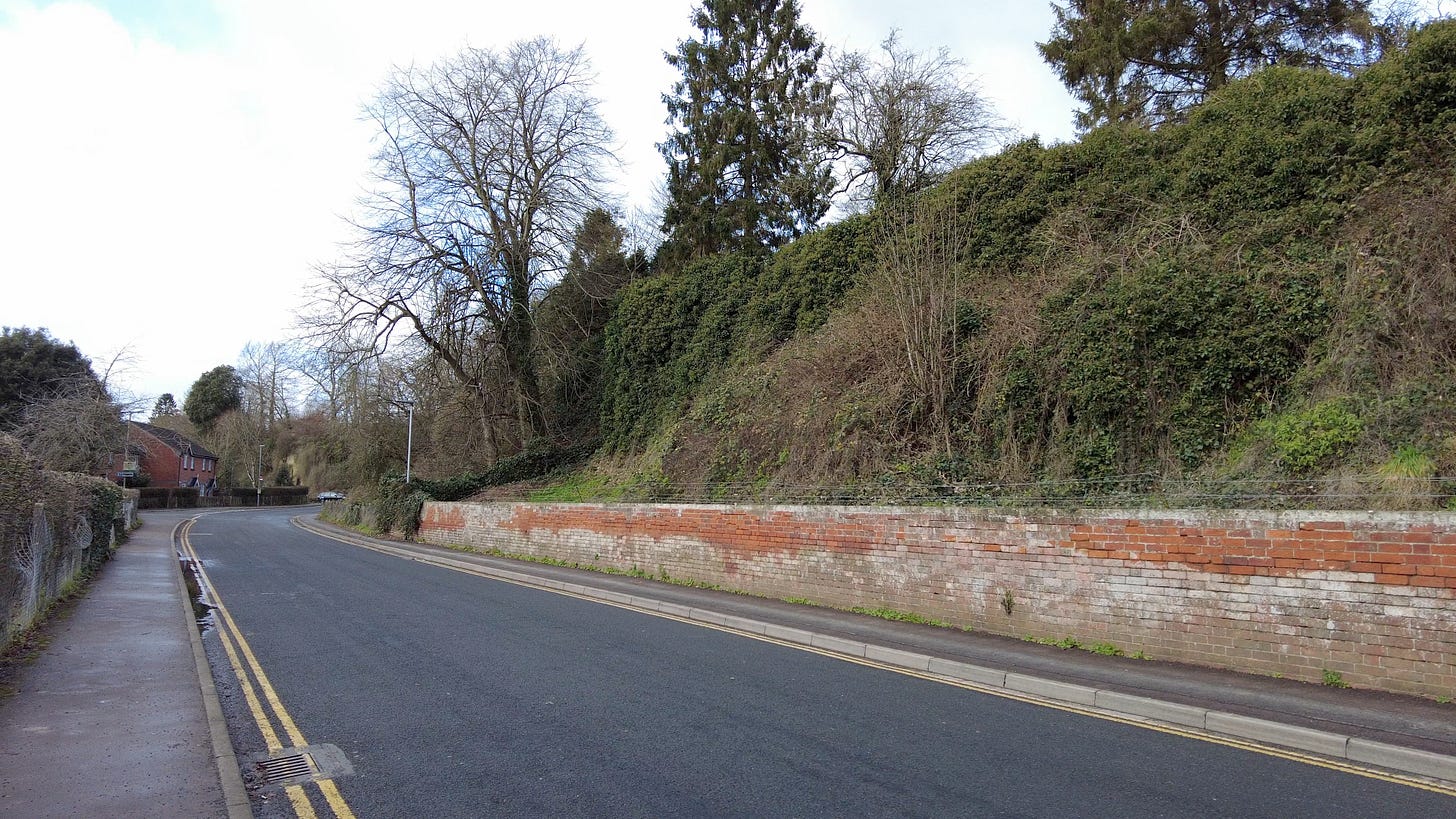The Attempted Murder of Emily Lister, Devizes
What happened on the steam train travelling from Devizes to Bristol?
I want to take you back in time. It’s Friday, May 31st 1889 and it’s the Whitsun holiday. We are in Station Road, Devizes at the railway station at the bottom of the hill below Market Place. A young lady and gentleman are in a heated conversation, their voices often raised.
Noticing the couple was Police Constable George Smith. At 1.25 pm, he saw them standing near a lamppost and, in his words, described them as “having some high words”. There was no violence. Smith went into the railway station, and he met them again as they were going into it. They were still quarrelling. PC Smith quoted the woman, “It is too late, now.” The man replied, “Too late, be d—–; what do you mean by that?” Smith noted that the couple then entered the station, and the woman appeared to be very upset. He didn’t know who they were and had not seen them before.

Emily Lister and Augustus Keeling
The woman was Emily Lister, a recently appointed headmistress of the British School for girls in Northgate Street, Devizes, not far from the scene of this altercation. The man whom I can disclose was Augustus Keeling. Miss Lister had moved from Brighton to take up her post at Devizes, and Keeling had followed her. He had arrived in Devizes on Wednesday, May 29th and was lodging at The White Lion, not far from the station and the school. Emily lived at 2 Trafalgar Place, Bath Road, Devizes, which is only a short walk from these places. Keeling had also applied for a teaching job at the same school as Emily.


Emily Lister was going to her family who lived in Birmingham, and the train would take her to Bristol, where she would change trains. Within earshot of Keeling, Emily purchased her ticket to Bristol and also retrieved a parcel she left there before having the row with Keeling in the street. Upon seeing her board the train, and enter a third-class carriage, Augustus Keeling hurriedly purchased a ticket to Seend, a very short distance along the track. He then joined the same carriage as Emily. The only two passengers who would be in it.
The train leaves Devizes at 1.37 pm in the usual cloud of steam and smoke. The track runs downhill as it travels towards Seend. Devizes is on a hill, and though the station is built on the lowest level, there is still a gradient. This gives the train some momentum, and it can reach speeds of (wait for it) 35 miles per hour! How times have changed since those days. The railway line and station were closed in 1966 under the Beeching Axe. The station is now a large car park. Some parts of the old embankments and bridges of the line are visible if you seek them out.
The Attempted Murder of Emily Lister
Crossing the bridge over what today is the A361 and is now a dual carriageway, something terrible was about to happen. The iron bridge was known as Fish Bridge due to its side-on appearance (see photo). Keeling took out a revolver and shot Emily twice in the head. She called out of the window for help. Keeling pushed her out.

It has to be noted that the early railway carriages were not interconnected. Once on the move, you could only change carriages if you were prepared to walk along the footboard running alongside the outside of the carriage.
On the train, a passenger, Mr Bryce of Bristol, heard the commotion, and he, along with others, made signals to the guard who stopped the train. Meanwhile, the event was also witnessed at the Fish Bridge by a permanent way railway track worker, Mr Burgess and a plasterer working nearby, George Williams. Williams heard a shot, and looking around, he saw Emily hanging out of the carriage, and then falling from the train to the embankment. He and Burgess rushed to find Emily lying on the ground. He related that she was a well-dressed, lady-like female and bleeding profusely but quite sensible. Emily could tell the two men her name, and Dr Cowie was sent for. Emily was vomiting blood and was taken to Devizes Cottage Hospital, where thankfully, she survived the ordeal, more details later on her injuries.
After the train stopped, it was noted that Keeling had left the compartment and walked along the footboard whilst the train travelled at 35 miles per hour. Walking back along the track, the body of Keeling was found terribly mutilated. It seems he had fallen and been run over by the train's wheels. He was described as “quite dead”. His body was taken to the mortuary at Devizes Workhouse, where later an inquest into his death would occur. That inquest has provided the records that helped me relate this story to you.
The railway carriage was sealed and taken to Trowbridge for examination by Henry White, a superintendent of the Wiltshire Constabulary. Mr White stated at the inquest on Saturday, June 15th 1889, “I examined this railway carriage at Trowbridge yesterday, and I produce what I found there. These were a woman’s jacket, which was placed in the rack; a revolver, which was lying on the floor of the compartment, with blood on the handle and the hammer. It was full cocked and contained six empty cases. The maker’s name was E Lanfaucheaux, Paris. A Standard of yesterday’s date, with several spots of blood on it, was lying over the revolver. There was a cartridge which had not been fired lying on one of the seats. On the floor was an open purse, all the money, except one penny piece, being loose on the floor. There was 17s 3½d altogether. On the seat was a lady’s waterproof, a pair of gloves, a parasol, umbrella and bag with some biscuits in it. On the opposite seat was a brown paper parcel (the one which had been left at the booking office, and previously claimed by Miss Lister), and a railway ticket from Devizes to Seend.”
John Fox, a sergeant at Steeple Ashton, was on the train, and he was present when Keeling’s body was found. He noted that in the breast pocket was an old leather case containing two photos of a female and two letters written by Emily.
Emily Lister’s Letters to Augustus Keeling
The letters were read by the Coroner and were as follows,
6, Blatchington Road,
W Brighton,
25/4/89.
My Dear Gus – I’m so sorry I annoyed you so last night, but I lost my usual temper and spoke in the heat of the moment. Now, old Gussie dear, you must not be wild with me any longer, but just forgive me like a dear old boy. And you’ve punished me quite enough by being so horribly cold and distant last night and saying “good night” like an icicle. Some time back when you had been horrid to me and I had forgiven you, you told me I was to ask you to forgive me and you’d do it at once. So now, old mannie, I claim that forgiveness, and you must write me a nice long letter to tell me you are sorry you were so distant to me and wish you had kissed me instead and so stopped my talking. If you come on Saturday be sure and let me know by what train, though don’t you think, dearie, it would be better not to come, as you have already done no business this week; then you could get on on Saturday, and I would come to you instead on Sunday week by the excursion. Excuse more, as breakfast is waiting, and I must be off to school. This is a dreadful scribble, but I felt I must write at once. Now mind and answer by return, and send a kiss to your old
Emmie
This was written on ordinary notepaper, and was very much soiled, as though it had been carried for some time in a dirty pocket. The other was written since Miss Lister has been at Devizes and was as follows,
2, Trafalgar Place,
Devizes,
28/5/89.
“Dear Mr Keeling, — I think it would be most inadvisable for you to write to Mrs Cable, and I hope you will not do so, especially as in her letter to me this morning she tells me she has been much worse again. I did not expect to receive a postcard from you this morning. You must have known that your letter could not fail to reach me, and I told you not to expect an immediate answer, as it would be more than likely I should be unable to give it; so instead of telling me not to be silly in keeping you waiting for an answer you should not be so silly as to expect me to write at once. I was all the more unwilling to promise to write because I guessed you would be sure to complain of ‘shuffling’ or some such other evil, when you have no reason. Now, laddie, why not have you done it. You know we cannot correspond as at one time, and the change is sure to provoke ill-feeling of one kind or another? We must part – you have agreed to it – why should we not do so in a friendly way? I have loved you deeply and do so still, but because misfortune has parted us surely we need not become enemies. You said, we must bow to fate, but if fate parts us we can do no more if we refuse to cherish any evil thought or suspicion that may suggest itself unbidden. You cannot be that to me which I had hoped – at least let me cherish untarnished the memory of your past love for me, Good-bye Gus.
I remain,
Yours sincerely,
E. Lister
Reading these letters, we can see that Keeling has been shoved aside romantically by Emily and has become the typical stalker/jilted lover with an axe to grind.
The Inquest into the Death of August Keeling
There were many witnesses at the inquest, including Emily’s brother, William Lister. He identified the dead man as Augustus Keeling, even with the bad injuries. William was asked about Keeling and the type of man he was. When asked if he thought Keeling was sane, he replied, “Not exactly.” He said he was peculiar, and the family didn’t like Emily seeing him. William also said that he and the family thought that the relationship was over and that when in Brighton, Keeling had been a perfect nuisance to Emily.
Emily could not attend the inquest. Of course, the inquest was not to establish the attempted murder but the cause of death of Augustus Keeling. The Coroner reminded the jury that the question determined how Keeling had met his death. If suicide, he would not have been able to have had a Christian burial in those days. The jury returned this verdict: “That the deceased met with his death by fracture of the skull caused by falling from a railway train, but whether such fall was accidental or intentional, there was no evidence to show.” An open verdict.
Augustus Keeling may well not have been his real name. Two pawn tickets were found in his pockets, with different surnames. His hat was bought in New York, and his pistol in Paris. Keeling was buried at the parish's expense as no one came forward despite national publicity of the case.
At the inquest, this statement was made about Emily Lister’s health.
It reads: Miss Lister is slowly recovering from her injuries. The vomiting of blood has entirely ceased, and she is able to take nourishment. On Tuesday she was able to converse about the affair. She says she did not know Keeling intended to get on the train. He jumped in at the last moment, and immediately on the starting asked her to give him some money. She refused, and he immediately jumped up, caught her by the hair, and fired two shots at her with a revolver. She then put her head out of the window for the purpose of calling for assistance, when her assailant took her by the feet and pushed her out of the window. She escaped death by shooting out almost miraculously, the bullets striking against the only parts of the skull they could possibly have struck without penetrating. These were just behind the ear, and at the back of the head where the skull is thickest. The bullets were both flattened against the bone.
Also, this was added. On the morning of the tragedy he (Keeling) tried to induce Miss Lister to go for a walk with him down a lonely lane near Devizes, but she refused. She is still unaware of the fact that Keeling is dead, and expresses a hope that he will be dealt leniently with, as she thinks he was not accountable for his actions. It appears that the testimonials he sent when applying for the situation as school teacher at Devizes were false.
It is said that due to the fall from the train, one of Emily’s eyes was so badly damaged that it had to be removed.
This is quite a story, and I am delighted that Emily Lister survived the attack. If anyone reading this article knows how Emily got on later in life, please leave a comment below or email rolandstravels@substack.com








Quite a story that!
That was very interesting. Thanks for writing it.